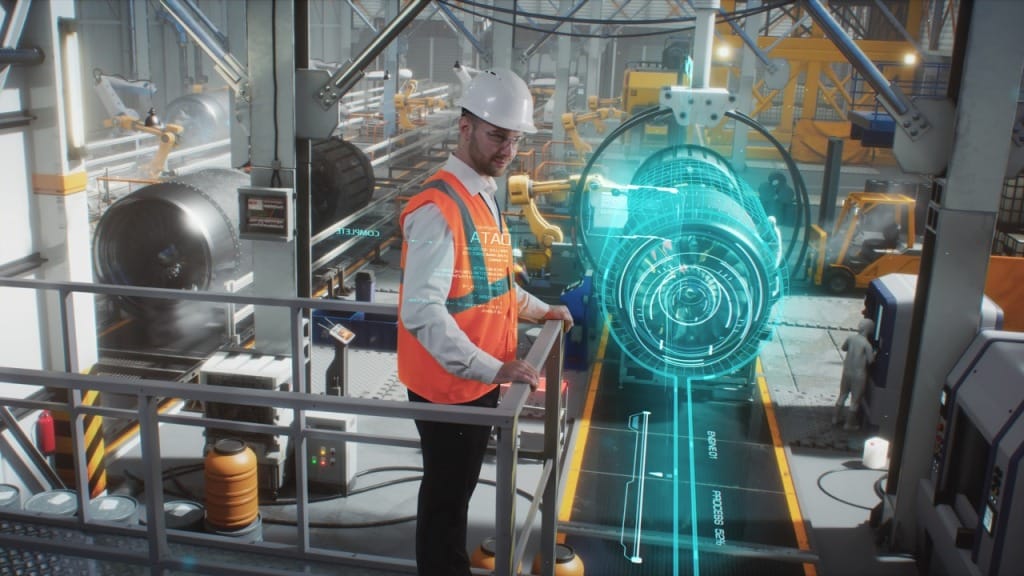Taking Flight: Optimizing Assembly Lines with AI in Aerospace Manufacturing
- ATMECS Content Team
- 3 Minutes Read
- Posted on June 24th, 2024
Introduction
At ATMECS, a leading technology services company, we understand the relentless pursuit of efficiency and innovation in the aerospace industry. This relentless drive is particularly crucial on the assembly line, where even minor delays can have significant downstream impacts. Fortunately, Artificial Intelligence (AI) is emerging as a game-changer, offering exciting possibilities for optimizing aerospace manufacturing. This blog explores how AI is transforming assembly lines, how AI and data analytics can empower engineers, and how ATMECS can leverage this technology to empower our clients.The Challenge: Complexity and Efficiency in Aerospace Assembly
Building an airplane is no small feat. Aircraft parts are intricate, tolerances are tight, and safety is paramount. This complexity creates challenges, especially on the assembly line, where there are:- Manual inspections: Highly skilled workers perform meticulous inspections, but this is time-consuming and prone to human error.
- Supply chain fluctuations: Delays in parts can disrupt workflows and lead to production bottlenecks.
- Data overloads: Manufacturers collect vast amounts of data, but extracting actionable insights can be difficult.
AI Takes Off: Streamlining Assembly with AI in aerospace
AI offers a powerful toolkit for addressing these challenges and optimizing assembly lines. Here are some key ways AI is making a difference:- Predictive Maintenance: AI algorithms can analyze sensor data from machines to predict potential failures before they occur. This allows for proactive maintenance, minimizing downtime and production delays.
- Automated Quality Control: AI-powered vision systems can inspect parts with exceptional accuracy and speed, reducing reliance on manual inspections and enhancing consistency.
- Advanced Robotics: Robots equipped with AI can perform complex assembly tasks with greater precision and efficiency, freeing human workers for higher-level activities.
- Supply Chain Optimization: AI can analyze historical data and predict demand fluctuations, enabling manufacturers to optimize inventory management and prevent disruptions.
- Data-Driven Decision Making: AI can analyze vast datasets to identify patterns and trends, helping manufacturers make informed decisions about production processes and resource allocation.
How AI and Data Analytics Can Enhance the Work of Engineers
While AI automates some tasks, it empowers engineers by:- Automating Mundane Tasks: AI can handle repetitive tasks like data analysis and anomaly detection, freeing engineers to focus on creative problem-solving and design optimization.
- Real-Time Insights: AI can provide real-time data and insights from the assembly line, allowing engineers to make adjustments and optimize processes on the fly.
- Predictive Maintenance: AI-powered predictive maintenance empowers engineers to proactively address potential equipment failures, minimizing downtime and ensuring production continuity.
- Data-Driven Design: AI can analyze vast amounts of data to inform design decisions, leading to lighter, stronger, and more efficient aircraft components.
ATMECS: Your Partner in AI-Powered Aerospace Manufacturing
At ATMECS, we are at the forefront of implementing cutting-edge technologies like AI. We offer a range of services to help our clients leverage AI and data analytics in their aerospace manufacturing operations:- AI Strategy and Implementation: We help define AI roadmaps, identify use cases, and develop a clear plan for AI adoption.
- Custom AI Solutions: Our team of engineers can design and develop bespoke AI applications tailored to your specific needs.
- Data Integration and Management: We can help build a robust data infrastructure to collect, store, and analyze the data necessary for AI algorithms to function effectively.
- Talent Acquisition and Training: We can assist in finding and training the talent required to develop, deploy, and maintain AI systems.
- Increased Efficiency: AI can streamline workflows, minimize downtime, and optimize resource allocation.
- Enhanced Quality: AI-powered inspections ensure consistent quality control and minimize defects.
- Reduced Costs: Improved efficiency and fewer errors lead to significant cost savings.
- Data-Driven Insights: AI can unlock valuable insights from data, leading to better decision-making.




